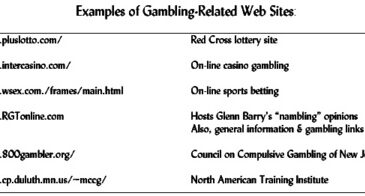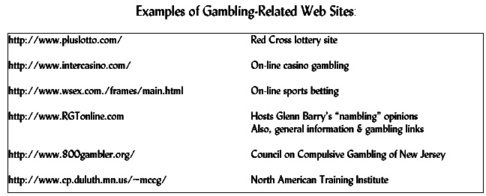On April 18, 1997, the first official draw of the PLUS on-line lottery game will take place. This lottery game is authorized and controlled by the Liechtenstein government. The profits will support the International Federation of Red Cross and Red Crescent Societies. Some observers and opponents of the gambling industry fear that Internet gambling is quickly becoming an enormous draw to gamblers both with and without gambling problems. Others, including a writer for the “Rolling Good Times” web site, believe that “nambling” (net gambling) is in its “early days” and that many Internet sites face regulatory, logistic, and other struggles. These struggles include security concerns, technological difficulties, consumer skepticism, and regulatory beauracracy*. The National Association of Attorney Generals has mobilized an Internet Gambling Staff Subcommittee within the Internet Task Force to review and report on the status of on-line gambling. This subcommittee has recommended that two existing U.S. laws be amended to directly address on-line gambling**. The subcommittee is currently exploring legislative means to prevent fraud on the Internet***. An Interactive Gaming Council (IGC) formed by the Interactive Service Association is developing an operational and regulatory code of conduct for those interested in launching on-line gambling sites1. Although future technology is likely to enable gambling sites to simulate traditional forms of gambling more vividly, it is uncertain if the sites will attract the numbers of consumers necessary to run a successful gambling operation. So far, on-line gambling has been unable to compete against “real world” gambling****. The time it takes to download the graphics, the fear of disclosing personal financial information over the net, and the inability to know with certainty that there is any possibility of winning are all factors that have slowed the growth of Internet gambling. In addition, individuals without access to a computer with a modem and an internet connection do not have the option of on-line gambling. Future research will begin to determine characteristics of internet gamblers. For example, while gamblers who live in states or countries without gambling opportunities may be attracted to on-line gambling, those who gamble primarily for social reasons may find on-line gambling both financially and emotionally unrewarding.
Sources:
*Hogan, B.A. (1997, April). Virtually there. International Gaming & Wagering Business, 18(4), pp. 53-54, 56-57.
**Internet Gambling Staff Subcommittee. (1996, June 11). Gambling on the internet: A report to the internet working group of the National Association of Attorneys General.
***National Association of Attorneys General . (1996, November/December) General Humphrey editorializes against internet gambling. Gaming Developments Bulletin. Washington, D.C.: Author.
****Rose, Professor I.N. (1997, March 4). Internet gambling: Outlaw or regulate now. Gambling and the Law ®.





